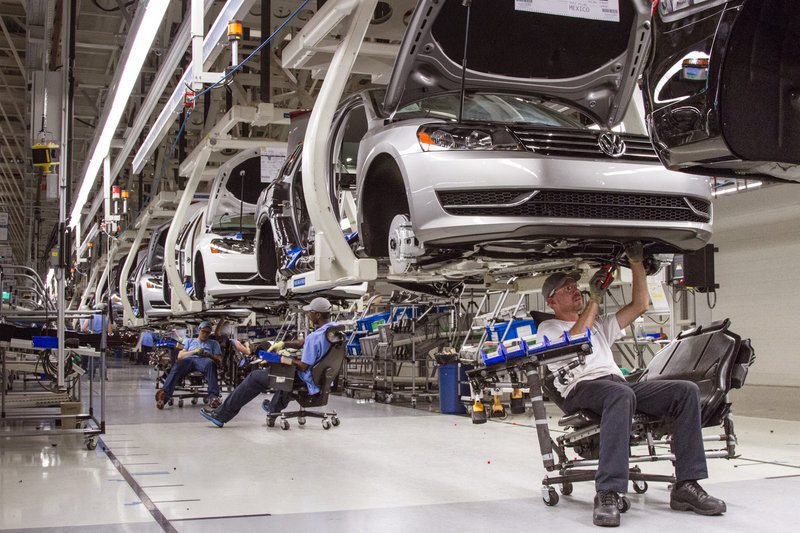CHATTANOOGA, Tenn. – The prospect of the United Auto Workers gaining a new foothold at Volkswagen’s plant in Tennessee worries some Southern Republicans, who say laws banning mandatory union membership have helped lure foreign automakers.
But Volkswagen faces pressure from labor interests on its supervisory board to grant workers a stronger voice at the plant. And Handelsblatt, a German business newspaper, reported Monday that UAW President Bob King and five other officials discussed the Tennessee plant with the company’s employee relations chief last week at VW’s headquarters in Wolfsburg.
Tennessee Gov. Bill Haslam warned Tuesday that his state’s prospects could suffer if the UAW succeeds in representing workers at Volkswagen’s lone U.S. assembly plant in Chattanooga. It’s an argument that many Southern politicians have made, fearing that union representation would deter businesses — and badly needed jobs — from coming to their respective states.
“We have heard from other folks that we’re recruiting that that would be dampen their enthusiasm with Tennessee,” Haslam said.
Volkswagen has declined to comment on reports that the company is meeting with the UAW. But Jonathan Browning, Volkswagen Group of America’s president and CEO, said Wednesday that labor questions will be left to workers at the plant.
“It may or may not result in third-party representation,” he told analysts, according to a spokesman. “Ultimately (it’s) up to the employees. That hasn’t changed.”
German law gives labor representatives half the seats on Volkswagen’s supervisory board, where some members have raised concerns about the Chattanooga plant being alone among the company’s large factories without formal labor representation.
That has led some to look toward creating a German-style works council, where elected labor representatives are given a voice in plant management.
Gary Chaison, a professor of labor relations at Clark University in Worcester, Mass., said it would take “tremendous flexibility” for the UAW to agree to a works council that falls short of traditional collective bargaining.
“Some people will see this as unions getting a foot in the door and asking for more,” he said. “But some within the labor movement would say we’ve got the wrong foot in the wrong door, and we should be trying for collective bargaining and nothing more.”
Carol Daugherty Rasnic, an international and labor law professor at Virginia Commonwealth University, said U.S. law is largely silent on works councils. An agreement between a workers group and the company would be covered by “plain old fundamental contract law,” she said.
The UAW and its opponents disagree on whether a works council could be established in the United States without the participation of an established union. Rasnic said the latter route might be preferable for Southern workers.
“The advantage for the local workers would be they don’t have to look up to any master union rules or pay dues or anything,” she said. “They would be their own party.”
While a decision on whether to organize is up to the plant’s workers, Volkswagen has sought advice from politicians like Republican U.S. Sen. Bob Corker.
Corker said he urged Volkswagen to discourage workers from choosing the UAW to represent them, and argued that potential investors in Tennessee have already been scared off by the possibility of the union gaining wider influence.
The UAW has failed so far to make inroads with foreign automakers in the South. The companies have fended off the union by offering competitive wages and benefits.
Send questions/comments to the editors.



Success. Please wait for the page to reload. If the page does not reload within 5 seconds, please refresh the page.
Enter your email and password to access comments.
Hi, to comment on stories you must . This profile is in addition to your subscription and website login.
Already have a commenting profile? .
Invalid username/password.
Please check your email to confirm and complete your registration.
Only subscribers are eligible to post comments. Please subscribe or login first for digital access. Here’s why.
Use the form below to reset your password. When you've submitted your account email, we will send an email with a reset code.